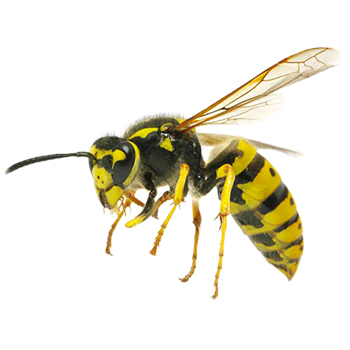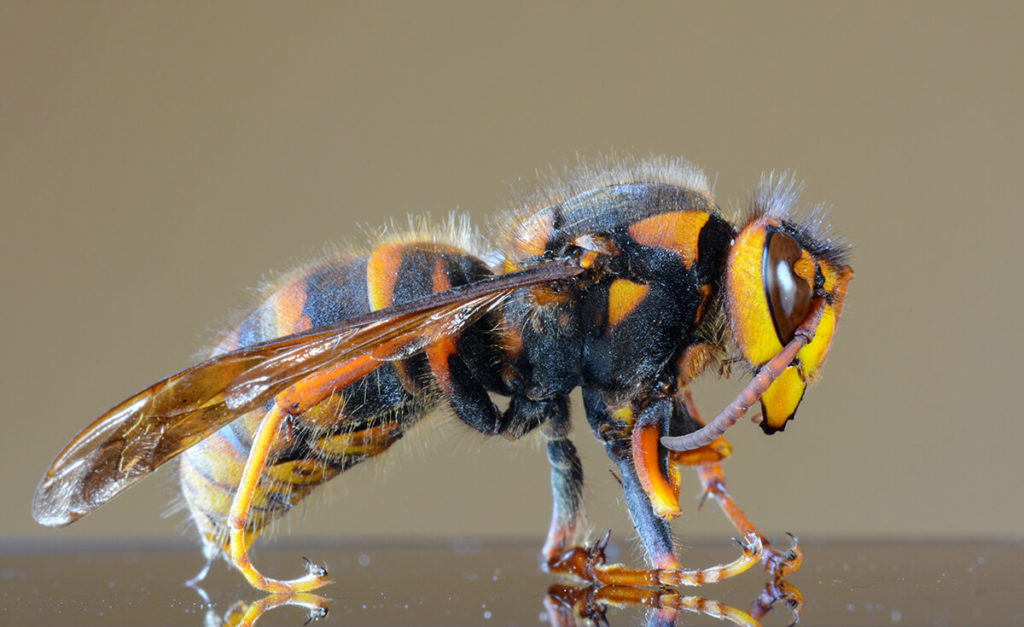Hornet Exterminator and Pest Control

What Are Hornets?
Hornets are a relatively large type of flying insect in the genus Vespa, closely related to bees. Hornets are a type of wasp and are often mistaken for Yellow jackets. Like other wasps, hornets are eusocial – meaning they divide labor into reproductive and non-reproductive groups, care for the offspring of others, and have overlapping generations of adults within a colony of adults.
Hornet control experts explain hornets live in nests constructed using the pulp of softwood that they have masticated. A single queen hornet is at the top of the hive hierarchy, and all other hornets prioritize her safety over all else. She is the only hornet that can lay eggs, so the hive won’t survive without her. Most workers are asexual female hornets, while the only purpose of short-lived male hornets is to reproduce with the queen. Queens begin their nests in the spring after hibernating through the winter. To protect your home or business from hornets, you need to learn about the behavior of this pest, take steps for prevention, and find effective treatment options should an infestation occur.
How Can I Identify a Hornet?
Hornets are often confused for bees or other types of wasps. Hornets can grow to a length of more than 5.6 cm (2.2 in), though their average size is 3.2 cm (1.25 in). Hornets are usually striped yellow-orange and black, like many of their bee and wasp cousins, though many Hornets can though many have more red or brown coloring. Hornets are rounder and plumper than most bees and other wasps, with a pronounced abdomen behind the waist and a large head that sets them apart.
Viking’s hornet exterminators explain that hornets can be less aggressive than most other genera of wasps. If you’ve been stung by a hornet, however, you will also notice a few distinctive characteristics. Unlike bees, hornets and other wasps can sting you multiple times without stopping. Hornets do not dislodge their stinger after an attack. Hornet venom is more poisonous than other wasps’ venom, so their sting feels more painful.
How Do I Get Hornets?
Hornets can be found throughout the U.S. including Delaware, Maryland, New Jersey, Pennsylvania, and other East Coast areas. Getting rid of hornets is necessary because they can become protective of their nests and aggressive towards people. Hornets eat smaller insects and some types of tree sap, making them adaptable to a wide range of climates. Hornets usually hibernate during the winter under tree bark, paneling, or decomposing leaves or trees. Queens prefer to nest in hollowed out trees and similar spots. If any of these environments are near your home or business in New Jersey, Pennsylvania, Maryland, and Delaware, you could easily have a hornet problem.

What Are the Effects of Hornets on a Home or Business?
Unlike many other types of pests, hornets are unlikely to cause any damage to your home or business property. Hornets only hibernate in existing slots and build nests out of the material they produce. However, people exterminate hornets because they are extremely territorial insects that will sting anyone they see as a threat to their nests. When a hornet stings, it can release an attack pheromone that signals the rest of the hive to sting as well. A group attack by hornets can be very dangerous for humans and animals, especially if someone is allergic to their venom.
What is a Murder Hornet, and How Dangerous are They?
 The Giant Asian Hornet (Vespa mandarinia), better known as the Murder Hornet, has been spotted in the North-Western region of the United States. While there have been no official sightings throughout New Jersey, Pennsylvania, Delaware, or the Eastern Shore of Maryland, it is important to be educated on this pest, know what it looks like, and the effects of this pest on the environment.
The Giant Asian Hornet (Vespa mandarinia), better known as the Murder Hornet, has been spotted in the North-Western region of the United States. While there have been no official sightings throughout New Jersey, Pennsylvania, Delaware, or the Eastern Shore of Maryland, it is important to be educated on this pest, know what it looks like, and the effects of this pest on the environment.
Vespa mandarinia is the largest hornet in the world. A female worker hornet may grow up to 4 cm in length. While the Murder Hornet can sting humans, Honeybees are in the most danger. Murder Hornets invade Honeybee hives and eradicate all Honeybees within the hive. Without help from humans, Honeybees are defenseless against the Murder Hornet. If the Murder Hornet becomes prominent in the United States, the Honeybee population will decrease exponentially. If you see them on your property, especially if you have honeybee populations nearby, it’s important to call a professional hornet exterminator.
“The European Hornet is a hornet that lives in our area that can be mistaken for a Giant Asian Hornet,” says Craig S. ACE, PHE, Viking Pest’s Service Director. “The European Hornet is noteworthy for being the only stinging insect in the area that stings at night.”
How Do I Prevent Hornets?
Although hornets are widespread, there are a few precautions you can take to prevent getting them.
Viking Pest’s hornet exterminators suggest preventing hornets begins with a look around your property. If you’ve got any hollowed-out trees or other ideal nesting spots for hornets nearby your home or business, clear them out or close them off if possible. Without a nesting spot, it’s unlikely that hornets will become a problem. Since Hornets usually hibernate under tree bark, decomposing leaves, and trees, or paneling, our pest control experts recommend removing as much of this material as possible from around your home or business.
If you have a green area near your home or office, you can also try planting herbs and flowers that naturally deter hornets. This is a great option for anyone who prefers a long-term solution. Planting herbs like mint, peppermint, and wormwood around the border of your garden can help you keep hornets off your property now and in the future.
Unlike bees, who are attracted to bright floral colors because they feed off of nectar, hornets eat other insects so they are often indifferent to lighter colors. The color black, however, makes them more aggressive. Because hornets and other wasps are blind to the color red, they see red as black, making red another color of aggression. Try to avoid using red or black as the primary color in your outdoor areas so that any hornets that are nearby will not become aggressive pests.
If you have a serious hornet problem, there are a lot of benefits to calling a hornet control professional for help. In states like New Jersey, Delaware, Maryland, and Pennsylvania, hornets can get out of control quickly and become a danger to anyone who comes close to their nests. The professional hornet control experts at Viking Pest have all the gear and treatments needed to effectively solve your hornet problem. It’s ideal to address a hornet infestation before the spring when the hive begins to flourish, but a professional pest control company, like Viking Pest, can help you remove the hive at any time of year.














